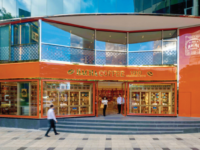As international travelling resumes after a two-year hiatus due to the Covid-19 pandemic, travel retailer Flight Centre is unveiling a new slimmed-down business model.
In what the company describes as “Flight Centre Brand 4.0” the business will focus on embracing its three core assets: its people, its product, and its global retail footprint. The company believes it has developed an industry-first “blended ecosystem of technology and traditional booking systems” with the new model.
An omni-retail approach, blending the different ways Flight Centre clients book travel – in-store, on mobile or desktop, over the phone or via Flight Centre’s app – will be anchored on a soon-to-be-launched global website with what the company describes as “world-class booking functionality”.
The site will carry a standardised global brand, with regional and in-store functionality for bookable travel products, pricing, and promotions.
“We’ve used the past two years to right-size the business and reinvent Flight Centre after taking stock of our future ambitions,” said founder and CEO Graham ‘Skroo’ Turner. “Without leaving our core assets behind, we’re moving from a world of complexity to one of simplicity for our customers and consultants.”
Having repositioned the business to survive the pandemic, Turner believes that with the world beginning to exit that era, now is the time to focus on creating “a savvier and more streamlined business model”.
“As such, we are improving the value and expertise of our consultants who will operate in a face-to-face environment, supported by the most sophisticated of online platforms.”
Flight Centre new business model
The new FCB business model features a dynamic and globalised pricing strategy, a consistent customer experience regardless of the location, an intuitive booking system dubbed Helio with an automated best-deal search engine and a single view display of end-to-end journey booking data visible to both client and consultant.
“Our new online platform will feature a single booking portal that customers and consultants can access seamlessly, whether the booking is made in-store or online. Via our new omni-retail model, the business will increase its online sales to 40 per cent of total transactional value by 2025,” said Flight Centre Travel Group’s New Zealand MD David Coombes.
The booking platforms are also designed to meet what Coombes describes as evolving customer demand for an ability to make decisions around their travel options that take into account their impact on climate change, but allowing carbon offsetting and transparency on CO2 emissions.
“Our suppliers are also taking positive steps to reduce their impact, with many of our preferred partners having implemented comprehensive environmental and broader Corporate Social Responsibility strategies,” he said.
Coombes says travel has bounced back quicker than the company expected, leaving it trading at more than 60 per cent of the pre-Covid level – but with only one-quarter of the staff.
Flight Centre growth
Flight Centre opened its first shop in Australia in 1982 and has since expanded into 27 countries with brands including its original red and white Flight Centre stores, along with Travel Associates, independents and, under its corporate arm, Corporate Traveller and FCM.
Turner says the company has grown a long way from its small beginnings.
“More than 40 years ago, I flew to London as a uni grad and had a hair-brained idea that buying a run-down double-decker bus would be a cheap, but effective way to drive around Europe. A few friends liked the idea too and pretty soon, we worked out people would actually be willing to pay to come along with us on some of our fun.
“That was the start of Top Deck Travel and became the catalyst for the birth of Flight Centre.”
This article was first published on Inside Retail.












